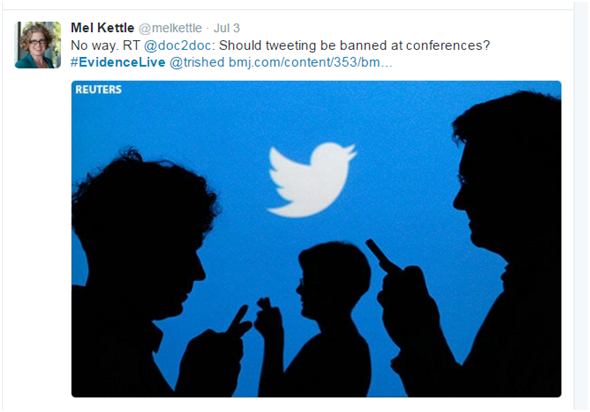 Recently, Trish Groves reported in The BMJ that some conference organisers would like to ban the use of Twitter and other social media at conferences. The main concern seems to be the transmission of pictures of speakers’ slides, which may contain otherwise unpublished data. I say “otherwise” because many do not seem to realise that the presentation of data at a meeting is a form of publication. It may, for example, prevent you from obtaining a patent.
Recently, Trish Groves reported in The BMJ that some conference organisers would like to ban the use of Twitter and other social media at conferences. The main concern seems to be the transmission of pictures of speakers’ slides, which may contain otherwise unpublished data. I say “otherwise” because many do not seem to realise that the presentation of data at a meeting is a form of publication. It may, for example, prevent you from obtaining a patent.
Concerns about hyping or misrepresenting results that have not been peer reviewed were also cited, but post-publication review is becoming increasingly common, and peer review has not previously prevented results from being hyped and misrepresented, to the detriment of public health.
Among Trish Groves’s solutions were clear statements of the conference’s social media policy in all online and printed materials, including guidelines for speakers; a unique hashtag (the example she chose was #EvidenceLive; see picture) to facilitate searching and sharing; asking speakers to state on their slides their consent (or dissent) and their Twitter handles; and projection of a live Twitter wall to let the audience engage with the debate. To ban the use of Twitter is in any case infeasible.

“Ban” comes from the hypothetical IndoEuropean root BHA, to speak. In Greek it became PHA, giving ϕήµη (voice, utterance, speech), ϕάσις (utterance, statement, assertion), ϕωνή (voice, sound), and -ϕήτης (a speaker). Polyphemus, the many or much voiced, had perhaps a lot to say or a wide reputation, and Phemius was Odysseus’s renowned minstrel. Blasphemy and euphemism are other derivatives. Phatic utterances communicate feelings rather than ideas. An apophasis is a denial. Dysphasia and paraphasia are disorders of speech, as is aphonia. Gramophones, telephones, and microphones convey sounds in their different ways, and a phoneme is the smallest linguistic unit of sound. A symphony orchestra may produce euphony or cacophony. A choir sings an anthem, originally an antiphony. A prophet foretells.
The Romans made BHA into FA, giving fari (to speak) and fateri (to acknowledge). An infant cannot speak. Fables, like Aesop’s, tell stories, as do those who confabulate. Fabliaux were originally short metrical stories, often coarsely humorous, current in France in the 12th and 13th centuries. The Canterbury Tales are fabliaux, as are The Ingoldsby Legends. Novels in verse include Eugene Onegin by Alexander Pushkin, The Golden Gate by Vikram Seth, and HRF Keating’s detective story Jack the Lady Killer. Stories may give you fame or infamy, tarnished by defamation, and fate is what is consequently foretold. A preface is something that is said in advance. Fado and fandango are expressive Iberian dances. One who is affable is easy to speak to. And then there is the ineffable, the unsayable, the inexpressible (Unaussprechlich), regarded by Wittgenstein as mystical, about which nothing can be said.
In Old English, ban originally meant to proclaim or summon by proclamation. Banns proclaim a forthcoming marriage. And what was banned (i.e. proclaimed) became banal, originally obligatory and perfunctory, then commonplace or trite. Later, ban meant to use maledictory language or simply to curse. Typically this meant religious anathema, and eventually ban came to mean to prohibit, influenced perhaps by banish, to outlaw by proclamation, as you might do bandits or runners of contraband. So now, instead of a word that means to speak or publish, we have a word that means to prevent from doing so.
The rapid responses to Trish Groves’s article were all against banning the use of Twitter at meetings. As Stephen J Chapman elegantly put it: “A ban on live tweeting at conferences is a policy on the wrong side of history.” Twitter itself may not last, but even if it folds we will not see the end of social media, and neither they nor their use can be banned effectively. Their power to change history has been demonstrated in other areas.
If you don’t want your data to be photographed and spread around the world, don’t show them. If I show data I’m delighted to have them given greater exposure, even though the chances of going viral are slim. And how, for example, without social media, would I effectively advertise the publication of this blog—#WhenIUseaWord?
Jeffrey Aronson is a clinical pharmacologist, working in the Centre for Evidence Based Medicine in Oxford’s Nuffield Department of Primary Care Health Sciences. He is also president emeritus of the British Pharmacological Society.
Competing interests: None declared.
